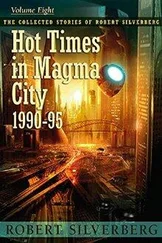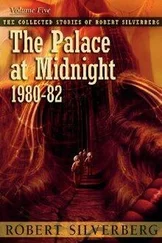Robert Silverberg - How it Was When the Past Went Away
Здесь есть возможность читать онлайн «Robert Silverberg - How it Was When the Past Went Away» весь текст электронной книги совершенно бесплатно (целиком полную версию без сокращений). В некоторых случаях можно слушать аудио, скачать через торрент в формате fb2 и присутствует краткое содержание. Год выпуска: 2007, ISBN: 2007, Издательство: Subterranean Press, Жанр: Фантастика и фэнтези, на английском языке. Описание произведения, (предисловие) а так же отзывы посетителей доступны на портале библиотеки ЛибКат.
- Название:How it Was When the Past Went Away
- Автор:
- Издательство:Subterranean Press
- Жанр:
- Год:2007
- ISBN:978-1-59606-089-0
- Рейтинг книги:4 / 5. Голосов: 1
-
Избранное:Добавить в избранное
- Отзывы:
-
Ваша оценка:
- 80
- 1
- 2
- 3
- 4
- 5
How it Was When the Past Went Away: краткое содержание, описание и аннотация
Предлагаем к чтению аннотацию, описание, краткое содержание или предисловие (зависит от того, что написал сам автор книги «How it Was When the Past Went Away»). Если вы не нашли необходимую информацию о книге — напишите в комментариях, мы постараемся отыскать её.
How it Was When the Past Went Away — читать онлайн бесплатно полную книгу (весь текст) целиком
Ниже представлен текст книги, разбитый по страницам. Система сохранения места последней прочитанной страницы, позволяет с удобством читать онлайн бесплатно книгу «How it Was When the Past Went Away», без необходимости каждый раз заново искать на чём Вы остановились. Поставьте закладку, и сможете в любой момент перейти на страницу, на которой закончили чтение.
Интервал:
Закладка:
His office at Fletcher Memorial had become an improvised center of operations for San Francisco. The mayor was there, pale and shrunken; the chief of police, exhausted and confused, periodically turned his back and popped a pill; a dazed-looking representative of the communications net hovered in a corner, nervously monitoring the hastily rigged system through which the committee of public safety that Bryce had summoned could make its orders known throughout the city.
The mayor was no use at all. He couldn’t even remember having run for office. The chief of police was in even worse shape: he had been up all night because he had forgotten, among other things, his home address, and he had been afraid to query a computer about it for fear he’d lose his job for drunkenness. By now the chief of police was aware that he wasn’t the only one in the city having memory problems today, and he had looked up his address in the files and even telephoned his wife, but he was close to collapse. Bryce had insisted that both men stay here as symbols of order; he wanted only their faces and their voices, not their fumble-headed official services.
A dozen or so miscellaneous citizens had accumulated in Bryce’s office too. At five in the afternoon he had broadcast an all-media appeal, asking anyone whose memory of recent events was unimpaired to come to Fletcher Memorial. “If you haven’t had any city water in the past twenty-four hours, you’re probably all right. Come down here. We need you.” He had drawn a curious assortment. There was a ramrod-straight old space hero, Taylor Braskett, a pure-foods nut who drank only mountain water. There was a family of French restaurateurs, mother, father, three grown children, who preferred mineral water flown in from their native land. There was a computer salesman named McBurney who had been in Los Angeles on business and hadn’t had any of the drugged water. There was a retired cop named Adler who lived in Oakland, where there were no memory problems; he had hurried across the bay as soon as he heard that San Francisco was in trouble. That was before all access to the city had been shut off at Bryce’s orders. And there were some others, of doubtful value but of definitely intact memory.
The three screens that the communications man had mounted provided a relay of key points in the city. Right now one was monitoring the Fisherman’s Wharf district from a camera atop Ghirardelli Square, one was viewing the financial district from a helicopter over the old Ferry Building Museum, and one was relaying a pickup from a mobile truck in Golden Gate Park. The scenes were similar everywhere: people milling about, asking questions, getting no answers. There wasn’t any sign of looting yet. There were no fires. The police, those of them able to function, were out in force, and antiriot robots were cruising the bigger streets, just in case they might be needed to squirt their stifling blankets of foam at suddenly panicked mobs.
Bryce said to the mayor, “At half past six I want you to go on all media with an appeal for calm. We’ll supply you with everything you have to say.”
The mayor moaned.
Bryce said, “Don’t worry. I’ll feed you the whole speech by bone relay. Just concentrate on speaking clearly and looking straight into the camera. If you come across as a terrified man, it can be the end for all of us. If you look cool, we may be able to pull through.”
The mayor put his face in his hands.
Ted Kamakura whispered, “You can’t put him on the channels, Tim! He’s a wreck, and everyone will see it!”
“The city’s mayor has to show himself,” Bryce insisted. “Give him a double jolt of bracers. Let him make this one speech and then we can put him to pasture.”
“Who’ll be the spokesman, then?” Kamakura asked. “You? Me? Police Chief Dennison?”
“I don’t know,” Bryce muttered. “We need an authority-image to make announcements every half hour or so, and I’m damned if I’ll have time. Or you. And Dennison—”
“Gentlemen, may I make a suggestion?” it was the old spaceman Braskett. “I wish to volunteer as spokesman. You must admit I have a certain look of authority. And I’m accustomed to speaking to the public.”
Bryce rejected the idea instantly. That right-wing crackpot, author of passionate nut letters to every news medium in the state, that latterday Paul Revere? Him, spokesman for the committee? But in the moment of rejection came acceptance. Nobody really paid attention to far-out political activities like that; probably nine people out of ten in San Francisco thought of Braskett, if at all, simply as the hero of the first Mars expedition. He was a handsome old horse, too, elegantly upright and lean. Deep voice; unwavering eyes. A man of strength and presence.
Bryce said, “Commander Braskett, if we were to make you chairman of the committee of public safety—”
Ted Kamakura gasped.
“—would I have your assurance that such public announcements as you would make would be confined entirely to statements of the policies arrived at by the entire committee?”
Commander Braskett smiled glacially. “You want me to be a figurehead, is that it?”
“To be our spokesman, with the official title of chairman.”
“As I said: to be a figurehead. Very well, I accept. I’ll mouth my lies like an obedient puppet, and I won’t attempt to inject any of my radical, extremist ideas into my statements. Is that what you wish?”
“I think we understand each other perfectly,” Bryce said, and smiled, and got a surprisingly warm smile in return.
He jabbed now at his data board. Someone in the path lab eight stories below his office answered, and Bryce said, “Is there an up-to-date analysis yet?”
Madison appeared on the screen. He ran the hospital’s radioisotope department, normally: a beefy, red-faced man who looked as though he ought to be a beer salesman. He knew his subject. “It’s definitely the water supply, Tim,” he said at once. “We tentatively established that an hour and a half ago, of course, but now there’s no doubt. I’ve isolated traces of two different memory-suppressant drugs, and there’s the possibility of a third. Whoever it was was taking no chances.”
“What are they?” Bryce asked.
“Well, we’ve got a good jolt of acetylcholine terminase,” Madison said, “which will louse up the synapses and interfere with short-term memory fixation. Then there’s something else, perhaps a puromycin-derivative protein dissolver, which is going to work on the brain-RNA and smashing up older memories. I suspect also that we’ve been getting one of the newer experimental amnesifacients, something that I haven’t isolated yet, capable of working its way deep and cutting out really basic motor patterns. So they’ve hit us high, low, and middle.”
“That explains a lot. The guys who can’t remember what they did yesterday, the guys who’ve lost a chunk out of their adult memories, and the ones who don’t even remember their names—this thing is working on people at all different levels.”
“Depending on individual metabolism, age, brain structure, and how much water they had to drink yesterday, yes.”
“Is the water supply still tainted?” Bryce asked.
“Tentatively, I’d say no. I’ve had water samples brought me from the upflow districts, and everything’s okay there. The water department has been running its own check; they say the same. Evidently the stuff got into the system early yesterday, came down into the city, and is generally gone by now. Might be some residuals in the pipes; I’d be careful about drinking water even today.”
“And what does the pharmacopoeia say about the effectiveness of these drugs?”
Madison shrugged. “Anybody’s guess. You’d know that better than I. Do they wear off?”
Читать дальшеИнтервал:
Закладка:
Похожие книги на «How it Was When the Past Went Away»
Представляем Вашему вниманию похожие книги на «How it Was When the Past Went Away» списком для выбора. Мы отобрали схожую по названию и смыслу литературу в надежде предоставить читателям больше вариантов отыскать новые, интересные, ещё непрочитанные произведения.
Обсуждение, отзывы о книге «How it Was When the Past Went Away» и просто собственные мнения читателей. Оставьте ваши комментарии, напишите, что Вы думаете о произведении, его смысле или главных героях. Укажите что конкретно понравилось, а что нет, и почему Вы так считаете.












